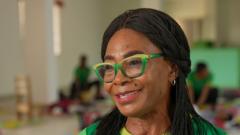In Nigeria, cerebral palsy remains a significant health concern, with only a handful of facilities to support affected children. Among those leading the charge is Nonye Nweke, who founded a Cerebral Palsy Centre in Lagos after struggling to find support for her own daughter, Zimuzo, diagnosed with the disorder. With a population exceeding 200 million and a rising number of neurological disorders stemming from untreated conditions like neonatal jaundice, Nweke’s work is vital.
A Mother's Quest: Transforming the Lives of Kids with Cerebral Palsy in Nigeria

A Mother's Quest: Transforming the Lives of Kids with Cerebral Palsy in Nigeria
As Nigeria grapples with a crisis in healthcare for neurological disorders, a mother's dedication to her daughter highlights a growing mission to support children with cerebral palsy.
Cerebral palsy, caused often by untreated jaundice among newborns, has left many families in crisis. Despite the life-altering implications, awareness and treatment availability are sorely lacking, especially in rural areas where stigma still prevails. Notably, Ms. Nweke’s centre currently supports twelve children, leaving a significant waiting list of over a hundred applicants eager for assistance.
New initiatives like the Oscar Project aim to transform the landscape of neonatal jaundice treatment by equipping facilities and training health workers, thus preventing cases of cerebral palsy from developing. As efforts grow, the hope is for a shift in societal attitudes and increased medical interventions in this West African nation, ensuring no child is left behind in receiving essential care.
Every day at the Cerebral Palsy Centre, caregivers provide round-the-clock support to the children. They engage them in activities, assist with meals, and conduct therapy sessions to ease stiffness. Though Nweke faces challenges, both emotionally and financially, she remains steadfast in her mission. “I decided to keep her [Zimuzo], and she’s my life,” says Nweke, reflecting the deep commitment of a mother fighting against daunting odds to ensure a better future for her child and others like her.
The road ahead is long, but with initiatives like the Oscar Project and the dedication of individuals like Nonye Nweke, there is hope for tangible change in Nigeria's healthcare system for children with cerebral palsy.
In the words of Oscar Anderson, the brainchild of the Oscar Project, "The work doesn't stop until every baby is protected against neonatal jaundice," highlighting the urgent need for change and the power of community in achieving a healthier tomorrow.
New initiatives like the Oscar Project aim to transform the landscape of neonatal jaundice treatment by equipping facilities and training health workers, thus preventing cases of cerebral palsy from developing. As efforts grow, the hope is for a shift in societal attitudes and increased medical interventions in this West African nation, ensuring no child is left behind in receiving essential care.
Every day at the Cerebral Palsy Centre, caregivers provide round-the-clock support to the children. They engage them in activities, assist with meals, and conduct therapy sessions to ease stiffness. Though Nweke faces challenges, both emotionally and financially, she remains steadfast in her mission. “I decided to keep her [Zimuzo], and she’s my life,” says Nweke, reflecting the deep commitment of a mother fighting against daunting odds to ensure a better future for her child and others like her.
The road ahead is long, but with initiatives like the Oscar Project and the dedication of individuals like Nonye Nweke, there is hope for tangible change in Nigeria's healthcare system for children with cerebral palsy.
In the words of Oscar Anderson, the brainchild of the Oscar Project, "The work doesn't stop until every baby is protected against neonatal jaundice," highlighting the urgent need for change and the power of community in achieving a healthier tomorrow.



















